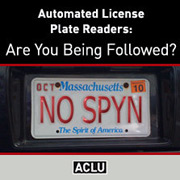On the same day, the ACLU and the ACLU of Massachusetts filed federal FOIA requests with the Departments of Justice, Homeland Security, and Transportation to learn how the federal government funds ALPR expansion nationwide and uses the technology itself.
"Tracking and recording peoples movements raises serious privacy concerns, because where we go can reveal a great deal about us, including visits to doctors offices, political meetings, and friends, said Kade Crockford, director of the Technology for Liberty Project of the ACLU of Massachusetts. We need legal protections to limit the collection, retention and sharing of our travel information and we need these rules right away.
What are ALPRs?

ALPRs are cameras mounted on stationary objects (telephone poles, the underside of bridges, etc.) or on patrol cars. The cameras snap a photograph of every license plate that passes them by capturing information on up to thousands of cars per minute. The devices convert each license plate number into machine-readable text and check them against agency-selected databases or manually-entered license plate numbers, providing an alert to a patrol officer whenever a match or hit appears.
When the ALPR system captures an image of a car, it also meta-tags each file with the GPS location and the time and date showing where and when the photograph was snapped. And often, the photographnot just the plate numberis also stored. The system gathers this information on every car it comes in contact with, not simply those to which some flag or hit was attached.
Whats The Problem?
When used in a narrow and carefully regulated way, ALPRs can help police recover stolen cars and arrest people with outstanding warrants.
Unfortunately, law enforcement agencies are increasingly moving towards a keep everything, share widely formula concerning ALPR data. The biggest problem with ALPR systems is the creation of databases with location information on every motorist who encounters the system, not just those whom the government suspects of criminal activity. Police departments nationwide are using ALPR to quietly accumulate millions of plate records, storing them in back-end databases. While we dont know the full extent of this problem, we know that responsible deletion of data is the exception, not the norm. Only two states have passed legislation barring the retention of non-hit plate data for extended periods. On the other hand, we know for certain that some departments are eagerly engaging in this surreptitious data collection.
As license plate location data accumulates, the system ceases to be simply a mechanism enabling efficient police work and becomes a warrantless tracking tool, enabling retroactive surveillance of millions of people.
Location information can reveal deeply sensitive and intimate details of our lives. As the International Association of Chiefs of Police has put it, mobile LPR (stet) cameras may collect the license plate numbers of vehicles parked at locations that, even though public, might be considered sensitive, such as doctor offices, clinics, churches, and addiction counseling meetings, among others.
ALPRs have already proven controversial. Just last month the Drug Enforcement Administration withdrew its request to install ALPRs along certain portions of Interstate 15 in Utah after they were met with resistance by local lawmakers.
In a case in which law enforcement agents attached a GPS device to a car and tracked it for 28 days, Justice Samuel A. Alito explained that societys expectation has been that law enforcement agents and others would notand indeed, in the main, simply could notsecretly monitor and catalogue every single movement of an individuals car for a very long period. ALPR systems pose the same risk, except they involve tracking all of us rather than specifically targeted individuals.






Comments